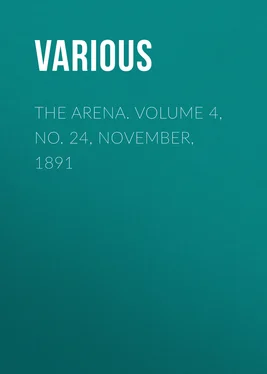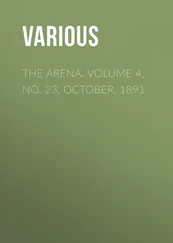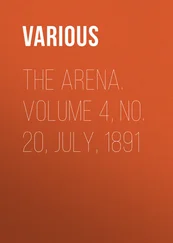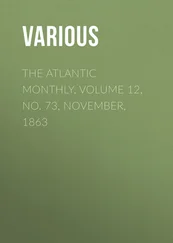Various - The Arena. Volume 4, No. 24, November, 1891
Здесь есть возможность читать онлайн «Various - The Arena. Volume 4, No. 24, November, 1891» — ознакомительный отрывок электронной книги совершенно бесплатно, а после прочтения отрывка купить полную версию. В некоторых случаях можно слушать аудио, скачать через торрент в формате fb2 и присутствует краткое содержание. Жанр: foreign_antique, periodic, foreign_edu, на английском языке. Описание произведения, (предисловие) а так же отзывы посетителей доступны на портале библиотеки ЛибКат.
- Название:The Arena. Volume 4, No. 24, November, 1891
- Автор:
- Жанр:
- Год:неизвестен
- ISBN:нет данных
- Рейтинг книги:4 / 5. Голосов: 1
-
Избранное:Добавить в избранное
- Отзывы:
-
Ваша оценка:
- 80
- 1
- 2
- 3
- 4
- 5
The Arena. Volume 4, No. 24, November, 1891: краткое содержание, описание и аннотация
Предлагаем к чтению аннотацию, описание, краткое содержание или предисловие (зависит от того, что написал сам автор книги «The Arena. Volume 4, No. 24, November, 1891»). Если вы не нашли необходимую информацию о книге — напишите в комментариях, мы постараемся отыскать её.
The Arena. Volume 4, No. 24, November, 1891 — читать онлайн ознакомительный отрывок
Ниже представлен текст книги, разбитый по страницам. Система сохранения места последней прочитанной страницы, позволяет с удобством читать онлайн бесплатно книгу «The Arena. Volume 4, No. 24, November, 1891», без необходимости каждый раз заново искать на чём Вы остановились. Поставьте закладку, и сможете в любой момент перейти на страницу, на которой закончили чтение.
Интервал:
Закладка:
But needless are further details of those abominations on which our rising young aspirant may turn an envious eye. He cannot but acquaint himself with the whole horrid list of chicanery, since its items are rungs of the ladder on which he himself may hereafter seek to mount. If he aims to be a great Wall Street spider he must perforce fully acquaint himself with what material will go toward the spinning of that baleful tissue, his proprietary web. It must be woven, this web, out of perjuries and robberies. Its fibres must mean the heart-strings torn from many a deluded stockholder’s breast, and the morning dew that glitters on it must be the tears of widows and orphans. The laws of a great republic are the foliage (alas, of a tree not too sturdy!) on which its devilish meshes are wrought! There is no exaggeration in stating that the financial history of the past three decades in America has been one of peerless turpitude. Rome under the dying glories of the empire scarcely parallels its knavish gluttonies of illegal seizure. And Wall Street has been the boiling point of all this infectious train of outrages against a patient people—one that presumes to rate itself really democratic, and to sneer at countries over seas in which to-day a Crédit Mobilier, a Pacific Railroad atrocity, a Manhattan Railroad brigandage, would make Trafalgar Square or the Place de la Concorde howl with savage tumult.
But let us return to our would-be Wall Street magnate. Suppose he has not the “grit” or the “go” (or whatever it would be termed in that classic purlieu so noted for elegance of every-day rhetoric) either to crown himself with the tarnished crown of a monetary “king” or even to hold a gilt-edged but scandal-reeking portfolio at the footstool of some such reigning tyrant. In this case he may join the great rank-and-file of those whose pockets have become irremediably voided and who seldom refer to Wall Street unless with muttered curses while dragging out maimed careers in various far less feverish pursuits; or he may, on the other hand, drift into that humble crowd of petty brokers (“curb-stone” or domiciled) whose incomes vary from fifteen hundred to as many thousands a year, and who pass hours each day in envy, whether secret or open, of the dignitaries towering above them. As one of these inferior persons his existence will continue, no doubt, until he changes it for the tomb: and meanwhile what sort of an existence has it been? All the finer human aims have appealed to him as pearls appeal to swine. He has, perhaps, possessed faculties which might have allowed him to shine ably and yet honorably in the state or national congress, whose votes his friends and rivals, to ensure the passage of their unscrupulous railroad-bills, have bought so often and with such bloodless depravity. But these faculties have been miserably misused. He may have loved some woman, and married her, and begotten children by her; domestic affection may have warmed his being, just as it does that of many a day-laborer. But in the arid air of Wall Street all his intellectual and ethical possibilities will have wilted and died. Lust for greater riches and a mordant, ever-smouldering disappointment at not having attained them, will replace the healthier impulses of adolescence. Books will have no savor for him; men of high attainments, unless their coffers brim with lucre, affect him no more than the company of the most unlettered oaf. He becomes, in other words, the typical Wall Street man, and he becomes this with a stolid indifference to all known motors of mental betterment.
It is not in any sense an attractive type. The Wall Street men are lilies that toil and spin (“tiger” lilies, one might term them, in remembrance of the old gambler-slang about faro and roulette); but their industries, however distinct, are what the political economists would call those of non-productive consumers. They are active drones, to speak with paradox, in the great hive of human energy. Like all gamesters, all men who live by the turning of the dice-box, they have a devil-may-care demeanor, now and then rather sharply peppered with wit, though wit not always avoidant of the obscene. For the most part, they are as ignorant of the large onward push of human thought as if they were farmers in some remote county of Arkansas. And yet they affect, at all times, an amusing omniscience. To “know it all” is a phrase beloved as sarcasm by their nimble vernacular, and though this (like “Come off!” and “Look here, what are you giving us?”) is a form of speech incessantly on their lips, one is prone sometimes to reflect how amazing is the meagreness of real knowledge which their “knowing it all” piteously represents. They are sometimes keen sportsmen, but a good many scamps, dolts, and cads are that. Their acquaintance with contemporary literature could be summed up by stating that if you should ask an average number of their class whether he had read the last novel of Mr. James, he might pull his moustache (the Wall Street man usually has a moustache, and often a symmetric and well-tended one) desiring to learn whether you had reference or no to G. P. R. James, of the “two horse-men” celebrity. Their ignorance, however, is not equal to their self-sufficiency. Almost whenever the average Wall Street man goes into good society he makes himself more pronounced there by his assurance than his culture. Of the latter quality he has so little that the best clubs of which he is a member tolerate rather than accept him. In most cases he is deplorably curt of speech and brusque of deportment. Suavity, repose, that kindliness which is the very marrow and pith of high-breeding, shock you in his manners as acutely by their absence as if they were rents in his waistcoat or gapes in his boot-leather. The “bluff,” impudence, and swagger of the Stock Exchange cling to him in society like burrs to the hair of horse or dog. He would be far more endurable, this socially rampant and ubiquitous Wall Street man, if he revealed the least shred of respect for those ideas and faiths on which his hard, cold course of living has necessarily trampled rough-hooved. He is so bright and intelligent, as a rule, that you wonder why he is so phenomenally vulgar. But his brightness and intelligence are of the quality, nearly always, that throws into hysteric giggles the “summer girl” on piazzas of third-rate hotels. Ordinarily, too, he has not the faintest conception of how deeply and darkly he bores people who would live apart from him, from his bejewelled and supercilious wife (her pretty head always goes an inch further backward when “Tom” or “Dick” has “made a strike in stocks”), and from the French maid, with her frilled cap, whom his children gabble to in their grammarless American-French, but whose unctuous idioms are Sanscrit alike to madame and himself.
Читать дальшеИнтервал:
Закладка:
Похожие книги на «The Arena. Volume 4, No. 24, November, 1891»
Представляем Вашему вниманию похожие книги на «The Arena. Volume 4, No. 24, November, 1891» списком для выбора. Мы отобрали схожую по названию и смыслу литературу в надежде предоставить читателям больше вариантов отыскать новые, интересные, ещё непрочитанные произведения.
Обсуждение, отзывы о книге «The Arena. Volume 4, No. 24, November, 1891» и просто собственные мнения читателей. Оставьте ваши комментарии, напишите, что Вы думаете о произведении, его смысле или главных героях. Укажите что конкретно понравилось, а что нет, и почему Вы так считаете.












